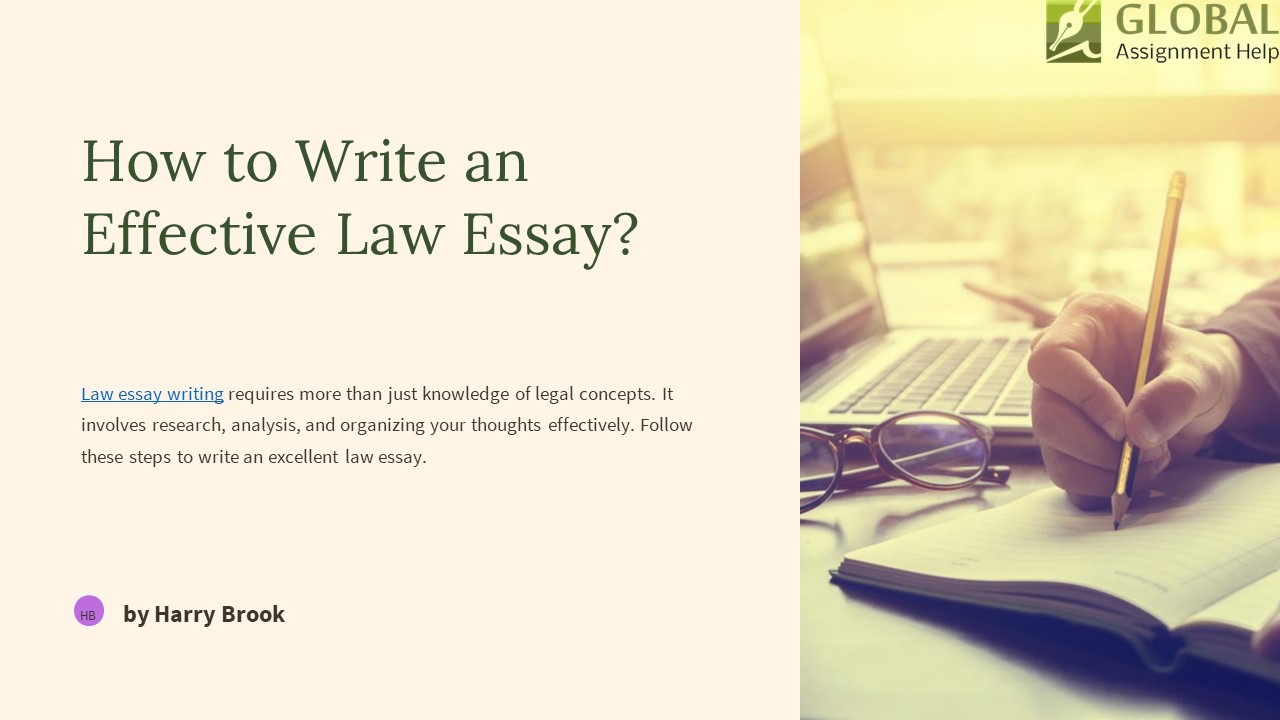How to Write an Effective Law Essay? - PowerPoint PPT Presentation
Title:
How to Write an Effective Law Essay?
Description:
Law essay writing involves more than just understanding legal principles. It requires thorough investigation, analysis, and efficient thinking organisation. For help writing a great law essay, go to the instructions below. – PowerPoint PPT presentation
Number of Views:4
Title: How to Write an Effective Law Essay?
1
How to Write an Effective Law Essay?
Law essay writing requires more than just
knowledge of legal concepts. It involves
research, analysis, and organizing your thoughts
effectively. Follow these steps to write an
excellent law essay.
HB
by Harry Brook
2
Understanding the Essay Prompt
1
Read the Prompt Carefully
Make sure you understand the requirements and
instructions. Identify the key issues and
concepts.
2
Consider the Structure
Determine what type of essay is required a
persuasive essay, an argumentative essay or a
compare and contrast essay.
3
Choose a Topic
Select a topic that interests you and aligns with
the prompt. Brainstorm ideas and focus your topic.
3
Research and Analysis
Use Reliable Sources
Identify Arguments and Counterarguments
Organize Your Findings
Look for arguments and evidence to support your
thesis statement while anticipating
counterarguments. Think critically about the
evidence you find.
Find credible sources such as academic articles,
case law, and primary sources. Take detailed
notes while researching.
Sort your research in a coherent order,
categorize and prioritize your findings, and take
note of any gaps in your research that need to be
filled.
4
Structuring the Essay
Create an Outline
Flowchart Your Essay
Mind Map Your Ideas
Organize your research into an outline and create
a structure for your essay. Use the outline to
guide your writing and ensure that all
requirements are met.
Create a visual representation of your arguments,
evidence, and research. This will help you to see
the connections between different elements of
your essay and ensure its logical flow.
Draw a mind map to organize your ideas and help
you to identify the connections between different
parts of your essay.
5
Writing the Essay
1
2
Introduction
Main Body
Begin with a strong opening sentence that hooks
the reader. Provide background information and
context, and present your thesis statement.
Write clear and concise paragraphs with good
transitions. Present your arguments and evidence,
citing your sources appropriately. Use topic
sentences to keep the focus on your thesis.
3
Conclusion
Sum up your arguments and provide a clear
conclusion based on your research. Restate your
thesis and the main points of your essay.
6
Editing and Proofreading
Edit for Structure
Eliminate Spelling and Grammatical Errors
Check Your Citations
Reread your essay for logic, coherence, and
structure. Check that each sentence serves a
purpose and that paragraphs flow smoothly.
Proofread your essay for errors in spelling,
grammar, and punctuation. Use editing tools to
help you spot mistakes.
Ensure that all your sources are cited correctly
and that you have included a reference section at
the end of your essay.
7
Conclusion
Revel in Your Success
Upgrade Your Skills
Read and Learn
Congratulations, you've written an effective law
essay! Make sure to celebrate your achievements.
Share your knowledge and inspire others to
succeed.
The more you write, the better you become. Invest
in your writing skills and get feedback from your
professors or peers. Attend writing workshops or
seminars, or take online courses to take your
writing to the next level.
Stay up-to-date with developments in the legal
field. Read legal journals, news articles, case
summaries, and other scholarly work to stay
informed. Cultivate a thirst for knowledge and
learning.































